Saturday, 27/07/2024 | 07:08 GMT+7
Speakers included Deputy Chief Officer of Steering committee office of energy efficiency (MOIT) Đặng Hải Dũng, Deputy Headmaster of Electric Power University (EPU) Dương Trung Kiên, Chairman of Viet Nam Energy Conservation and Energy Efficiency Association (VECEA) Nguyễn Đình Hiệp. Over 200 experts, media representatives and students participated in the forum.
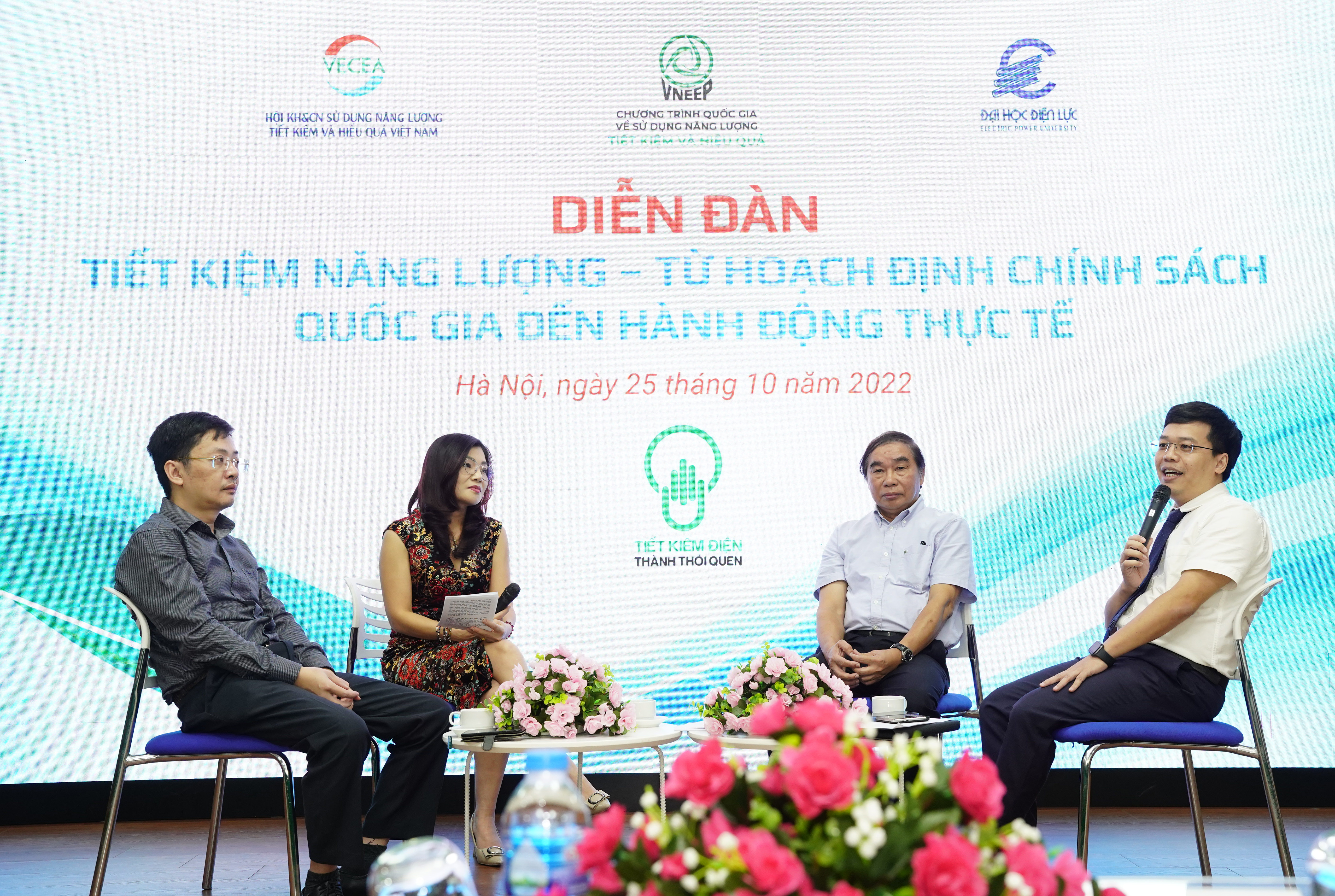
Speakers of “Energy Efficiency - From policy making to action taken” forum.
Speakers shared information about the legal framework relating to energy efficiency (EE), which is the foundation for all EE-related activities, and the difficulties and challenges in implementing EE measures. They also gave recommendations to leverage the effectiveness of EE, in which amendment of the Law on economical and efficient use of energy is the focal point.
Synchronized legal system
The energy demand for socio-economic development is increasing. At the same time, the globe faces unpredictable changes that could lead to a new energy crisis and insecurity. Hence, the Party and the Government considers energy efficiency an essential role in ensuring energy resources for demand of manufacturing and societal activities.
Therefore, according to Mr. Đặng Hải Dũng, the Party and Government have established legal framework on EE soon. The Law on economical and efficient use of energy was established in 2010, officially effective since 2011. EE-related under-law document systems, such as the Prime Minister’s Decrees, Circulars of Ministry of Industry and Trade and other ministries, have been built and established synchronized on time to promote EE in all fields of societal activities.
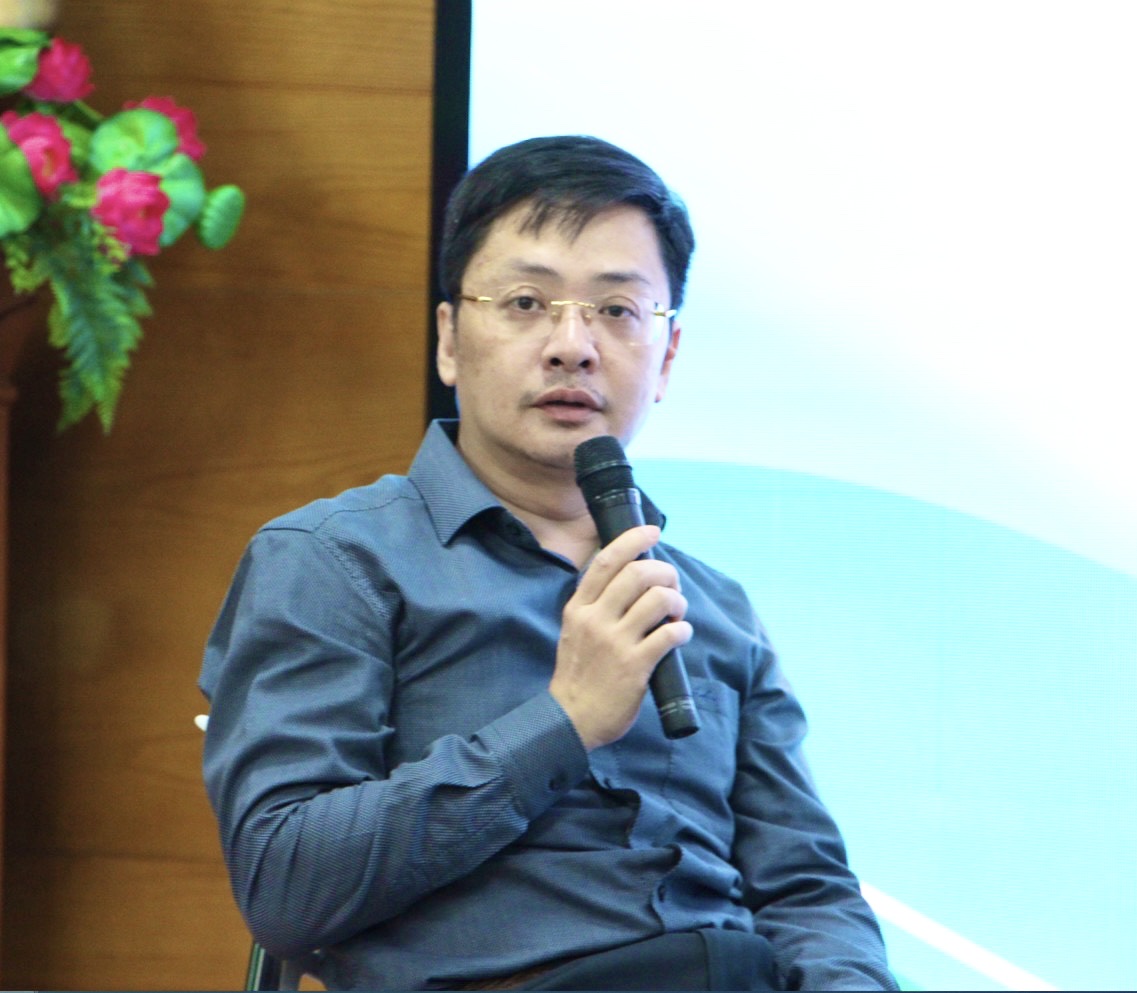
Deputy Chief Officer of Steering Committee of Energy Efficiency (MOIT) Đặng Hải Dũng
“Furthermore, the Government approved and organized several national programs, including the National Energy Efficiency Programs (VNEEP) in the period 2006-2015, according to the Decisive No. 79 dated April 14, 2006, VNEEP in the period 2019-2030, according to the Decisive No.280 dated March 13, 2019”, he said.
| Since the establishment of the Law on economical and efficient use of energy and the existing EE-related legal framework, the political system has engaged nationwide as well as awareness improvement and behavior changes of every partner of society. Enterprises, individuals and socio-political bodies have enthusiastically participated in taking EE action. Widespread activities, such as “Power saving household contests” by Women Unions and Earth Hour Campaign, have attracted a vast number of participants, especially youngsters. |
Mr. Nguyễn Đình Hiệp said that Decree No.102/2003/NĐ-CP on energy efficiency is a crucial document for promoting EE implementation in all production fields and social activities at national level. The document is also the first milestone of forming the domestic ESCO industry. After then, national energy efficiency programs concretized most EE activities nationwide.
One of the focal points of VNEEP in the first period was communication to raise awareness among communities, enterprises and the whole society about responsibility and benefits towards energy efficiency and EE measures. Hence, social awareness about EE has been raised significantly. According to MOIT’s assessment, more than 90% of individuals and enterprises have been informed about EE and EE measures and understand its benefits.
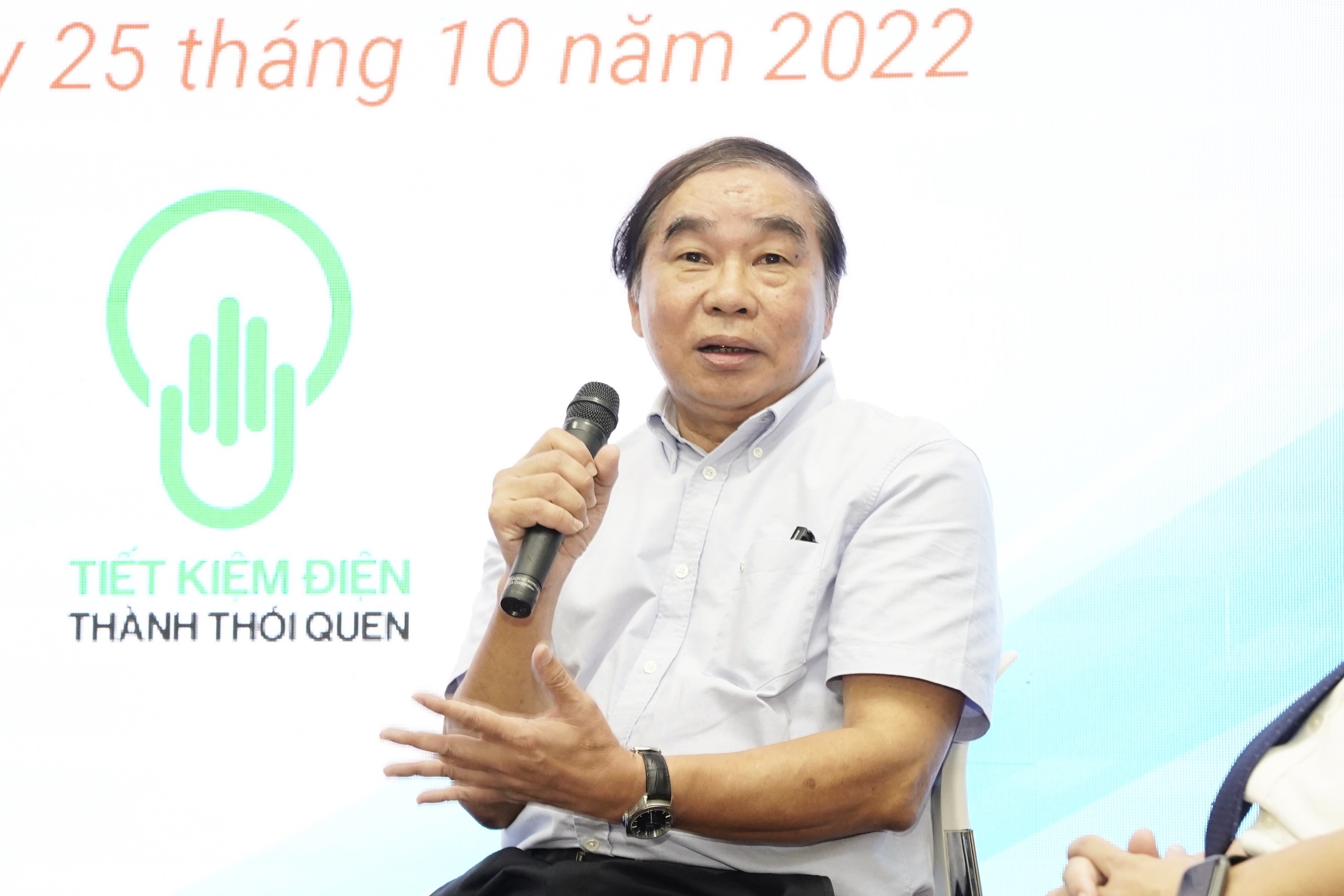
Chairman of VECEA Nguyễn Đình Hiệp
The Electricity Power University considers informing and communicating about energy efficiency policies crucial as a multidisciplinary academic institute, which includes various energy-specialized faculties.
Mr. Dương Trung Kiên said: “Educating and integrating energy efficiency knowledge focuses on three training fields: electricity, power and energy management. We built a calculating system that helps adjust behaviors of energy consumption. Precisely, energy-saving guidelines are available in all classrooms. We also pilot using some energy-saving equipment such as solar panels. At the same time, we promote communication on energy efficiency so that our students know their responsibility of saving energy.”
Challenge from human resource limitation
At the forum, speakers discussed the challenges VNEEP faced that caused several activities to be far behind expectations.
From the authorities’ perspectives, Mr. Đặng Hải Dũng recommended that one of the raising issues is human resource limitations. For example, he said, now about 52 regulations and technique standards are available to help assess numerous equipment, like building, boiler and industrial equipment. Students need to know which standard or regulations to refer to for each kind of machine. Hence, education quality has to be standardized at regional and international level.
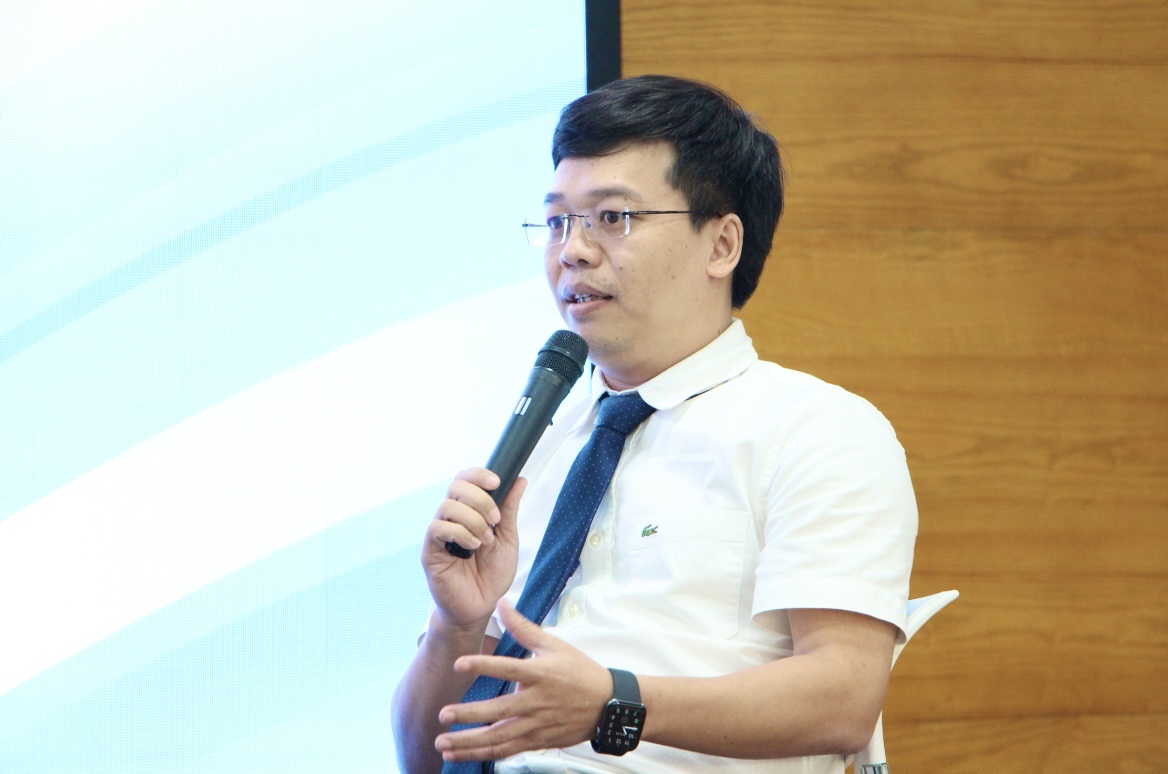
Deputy Headmaster of Electric Power University (EPU) Dương Trung Kiên
Agreeing with this opinion, Mr. Dương Trung Kiên confirmed that the energy saving potential of Viet Nam is enormous, but human resources and technologies are limited. Hence, great effort is required to solve the problem.
Regarding human resources, there is a lack of high-quality consultants specialized for energy saving solutions which significantly affect the outcomes, Mr. Kiên said.
Although there has been a Law on economical and efficient use of energy, the outcomes of energy efficiency activities need to catch up to expectations. The situation requires a law amendment. So, in the coming time, a number of reviewing and adjusting tasks relating to the Law will take place. Various precise solutions will also be proposed, Mr. Dũng said.
Need to review and amend the Law
Mr. Hiệp emphasized the urge to review and amend the Law. According to current regulations, solely key energy-use facilities, more than 3,000 companies, must take energy-efficient initiatives. They account for about 38% of the total energy use. The rest, however, “are encouraged” to take action. So, the Law’s amendment will expand the scope of subjects of obligatory liability to the extent that all one's contributing to 75%-80% of total energy use will be included, Mr. Hiệp said.
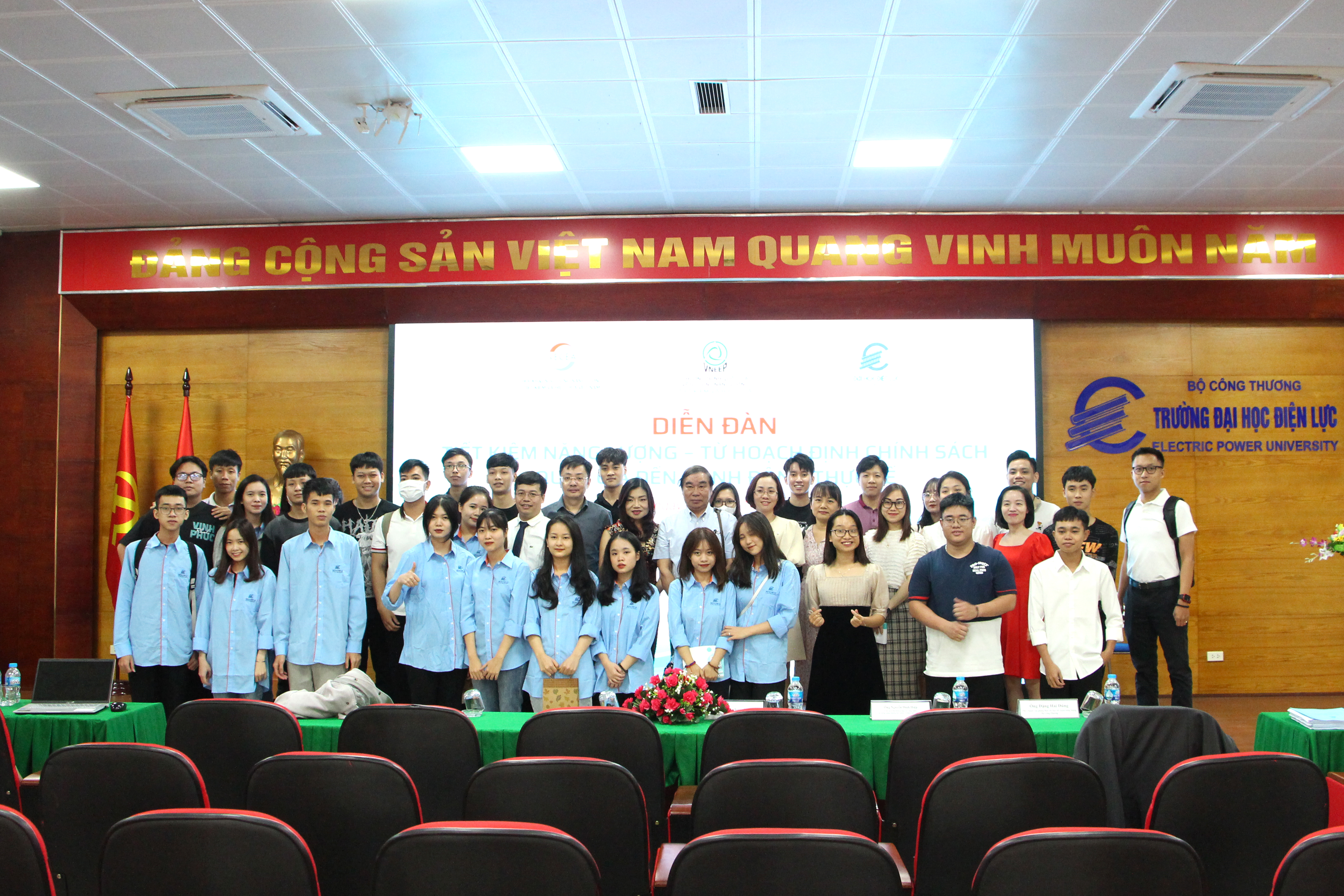
Speakers, participants and EPU students at the forum
Mr. Dũng shared that MOIT takes steps to apply energy efficiency policies and regulations smoothly. For instance, before banning 60W-incandescent bulbs, profound assessments had taken place and alternative products were introduced beforehand.
“Now, MOIT is taking on the task of reviewing and amending the Law. We also propose some promoting mechanisms including tax and specific fiscal policies for energy-saving projects and pilot an energy efficiency fund to promote energy-saving investment”, Mr. Dũng added.
Mr. Kiên commented that MOIT should collaborate with multi-stakeholders and take step by step to minimize the impact of changes on society while ensuring effectiveness.
From students’ perspectives, now it’s the right time to prove their roles and responsibilities to contribute to the goals of sustainable development and national energy security.
Many students enthusiastically joined in the discussion. They raised various questions and got useful information, such as the energy label system and how to assess equipment by its label, Earth Hours, energy-saving solutions, peak hours, etc.
Minh Khuê edited. Giang Nguyễn translated



.jpg?w=367&h=206&mode=crop)




.jpg?w=367&h=206&mode=crop) Notice for Contracts award for Support to Industrial Enterprises for Energy Audits and Preparation of Feasibility Studies (Package No. C2.2.4)
04/06/2024
Notice for Contracts award for Support to Industrial Enterprises for Energy Audits and Preparation of Feasibility Studies (Package No. C2.2.4)
04/06/2024
 Training Courses for Energy Managers and Energy Auditors
Training Courses for Energy Managers and Energy Auditors
 Vietnam Energy Outlook Report – Pathway to Net Zero
Vietnam Energy Outlook Report – Pathway to Net Zero
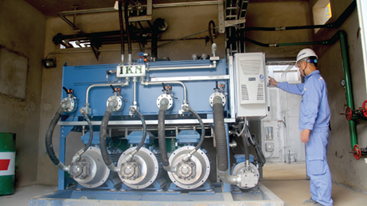 Long Son Cement saves 30% of electricity consumption thanks to heat recovery
Long Son Cement saves 30% of electricity consumption thanks to heat recovery
 Expression of Interest: C2.1.15: Development of Energy-Efficient Technology Catalogs for the Industrial Sector
Expression of Interest: C2.1.15: Development of Energy-Efficient Technology Catalogs for the Industrial Sector
 Optimizing Compressed Air Systems for Southern Industrial Enterprises
Optimizing Compressed Air Systems for Southern Industrial Enterprises
 The Ministry of Industry and Trade Review the Energy Efficiency and Conservation activities in Lao Cai.
The Ministry of Industry and Trade Review the Energy Efficiency and Conservation activities in Lao Cai.
 EOI Extension: C2.2.2: Review and update for current EE benchmarking for 2 sub-industrial sectors
EOI Extension: C2.2.2: Review and update for current EE benchmarking for 2 sub-industrial sectors